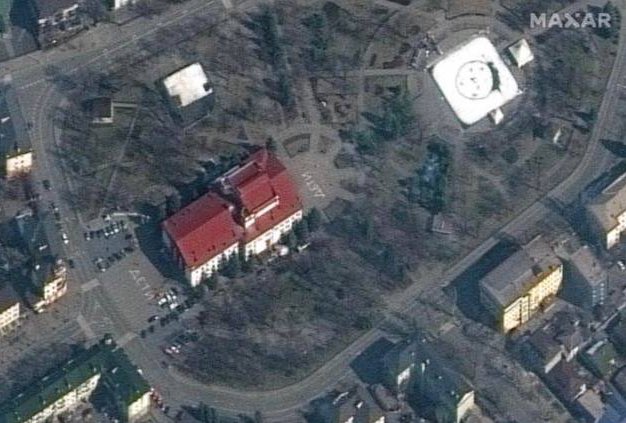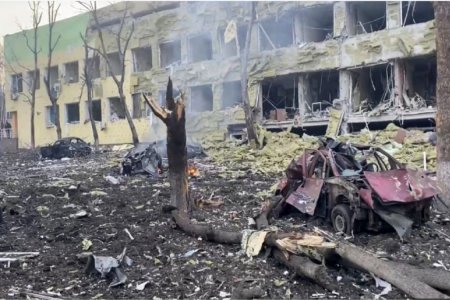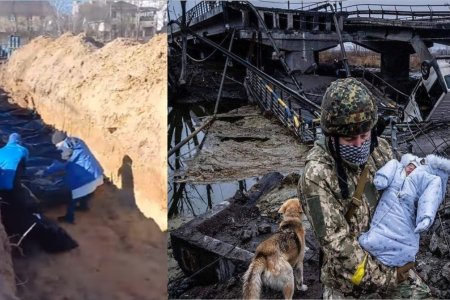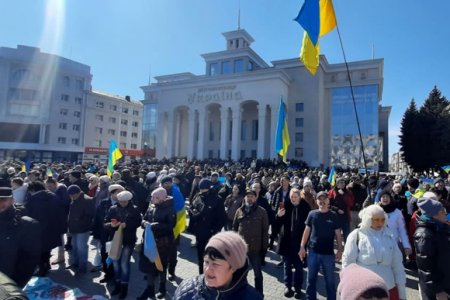
Scroll down for updated information
Russia has bombed the Donetsk Regional Drama of Theatre, a vital cultural centre in Mariupol until Russia’s invasion turned it into a believed shelter for over a thousand civilians, most of them women and children. The photos posted by the Mariupol city authorities leave no doubt about the devastation caused to the building, however the relentless bombing and shelling by Russian forces is almost certainly impeding any rescue attempts.
There is simply no possibility that the Russian military are not aware that they are bombing and shelling civilian targets in Mariupol. In the case of the theatre, there were big signs in Russian saying ‘children’ both in front of and behind the building.

The attack on the Drama Theatre comes a day after medics from the Mariupol Regional Intensive Care Hospital reported that the staff, patients and around 400 other civilians are being held hostage by the Russians who shoot at anybody who tries to flee. Prevented by Ukrainian Armed Forces from seizing the city, Russia is systematically bombing it, causing endless suffering and distraction. That this is deliberate policy is clear since, despite having caused a humanitarian crisis with dwindling food supplies, no running water, electricity or heating, Russia is still blocking proper evacuation of civilians. Over the last two or three days, a small corridor was agreed, but only for private cars to leave. Even here, however, the Russians did not keep their word with at least one car shelled on 16 March. Five people are reported to have been injured, with one of them a child who is in critical condition and has needed a serious operation.
Even before the horrific attack on the Drama Theatre, the number of victims of Russia’s onslaught were in the thousands. Nobody knows the real figure since it is simply too dangerous to retrieve bodies and the authorities have been forced to resort to mass burials.
The attack on 16 March came shortly after the United Nations’ International Court of Justice in the Hague ordered Russia to immediately suspend all military operations in Ukraine.
The Court [hereafter ICJ] had been considering the application filed by Ukraine on 26 February, two days after Russia launched its invasion. Ukraine asserts that Russia is violating the Convention on the Prevention and Punishment of the Crime of Genocide, by, for example, falsely claiming that Ukraine has committed ‘genocide’ in occupied Donbas, and using this falsehood as an excuse for its aggression against Ukraine. It specifically asked that ICJ impose provisional measures, ordering Russia to stop its attack on Ukraine.
Russia did not attend the hearings into these allegations, and later presented its written position, claiming, as it essentially always does in such cases, that ICJ does not have the jurisdiction to examine the case.
The Court disagreed, and ruled that Russia ““shall immediately suspend the military operations that it commenced on 24 February.” This was a vote of 13 judges against two - Vice-President Kirill Gevorgian of Russia and Xue Hanqin of China.
In its summary, the Court stated that it was “profoundly concerned about the use of force by the Russian Federation in Ukraine, which raises very serious issues of international law. “ It found that, prima facie, it has jurisdiction to consider the case and, therefore, rejected Russia’s application for it to be dismissed.
The Court noted that “Ukraine argues that it seeks provisional measures to protect its rights “not to be subject to a false claim of genocide”, and “not to be subjected to another State’s military operations on its territory based on a brazen abuse of Article I of the Genocide Convention”.
“The Court can only take a decision on the Applicant’s claims if the case proceeds to the merits. At the present stage of the proceedings, it suffices to observe that the Court is not in possession of evidence substantiating the allegation of the Russian Federation that genocide has been committed on Ukrainian territory. Moreover, it is doubtful that the Convention, in light of its object and purpose, authorizes a Contracting Party’s unilateral use of force in the territory of another State, for the purpose of preventing or punishing an alleged genocide.
Under these circumstances, the Court considers that Ukraine has a plausible right not to be subjected to military operations by the Russian Federation for the purpose of preventing and punishing an alleged genocide in the territory of Ukraine. “
In concluding, the Court ordered that “the Russian Federation must, pending the final decision in the case, suspend the military operations that it commenced on 24 February 2022 in the territory of Ukraine”. The Court added that it must not use the so-called ‘Donetsk and Luhansk people’s republics’ (which Russia controls) to pursue such military operations.
Such orders from the ICJ are, in principle, binding, however the Court has no mechanisms for compelling Russia to comply with them. Russia has, in fact, already flouted the same Court since 19 April 2017 when ICJ imposed provisional measures in another case brought by Ukraine, ordering that Russia withdraw its ban on the Mejlis, or self-governing body, of the Crimean Tatar people and allow education in the Ukrainian language in occupied Crimea.
The ruling remains important especially given the proceedings now underway at the International Criminal Court over alleged Russian war crimes and atrocities since the beginning of its invasion.
Update on 17.03.2022 Ukraine’s Human Rights Ombudsperson Liudmyla Denisova has confirmed that the structure of the Drama Theatre withstood the blast from the Russia bomb and at least some of the adults and children who were hiding in the bomb shelter have come out alive. There remains no information about the number of dead and injured.



